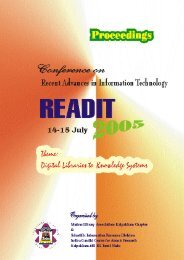READIT-2007 - Indira Gandhi Centre for Atomic Research
READIT-2007 - Indira Gandhi Centre for Atomic Research
READIT-2007 - Indira Gandhi Centre for Atomic Research
Create successful ePaper yourself
Turn your PDF publications into a flip-book with our unique Google optimized e-Paper software.
Industrial Safety In<strong>for</strong>mation:<br />
A Knowledge Management (KM) approach<br />
I.N. Nargund * and Joby Thomas *<br />
Abstract<br />
In<strong>for</strong>mation flow is an important factor in the minimisation of hazards to health and ensuring safe<br />
working conditions. Industrial Safety in<strong>for</strong>mation is needed by a wide spectrum of people in an industry.<br />
They need in<strong>for</strong>mation that is appropriate, relevant, up-to-date, usable, conveniently available and directly<br />
applicable to their specific circumstances. In this situation, Knowledge Management will play an essential<br />
role. Knowledge Management is an initiative undertaken to harness the knowledge and experience of its<br />
people. Sharing the best practices and experiences are very important in Industrial Safety Management.<br />
KM tools could give rise to Industrial Safety knowledge management systems that use knowledge to<br />
improve safety per<strong>for</strong>mance. The present paper highlights the need, objectives and importance of KM<br />
initiatives in industries and gives a brief account of how KM principles can be applied to Industrial Safety<br />
In<strong>for</strong>mation Management.<br />
Keywords: Knowledge Management; In<strong>for</strong>mation Services; Industrial Safety; Industrial Libraries<br />
1. INTRODUCTION<br />
Knowledge Management (KM) is more a concept than a technology. KM is more<br />
about best practices and procedures rather than pure technology. Consequently, it<br />
requires support from the employees of an organisation and effective use can happen only<br />
when all of them are actively involved. KM is a practice that addresses the need <strong>for</strong><br />
in<strong>for</strong>mation that is required <strong>for</strong> making effective decisions.<br />
In an industrial perspective, Knowledge Management is an art of creating value<br />
from intangible assets. It involves an integrated approach to the creation, capture,<br />
retention, accessing, sharing and leveraging of an enterprise's in<strong>for</strong>mation assets <strong>for</strong><br />
business gain. Knowledge Management is an initiative undertaken to harness the<br />
knowledge and experience of its people. It encompasses a very massive task of<br />
integrating the vast resources of an organisation. Knowledge management focuses on<br />
in<strong>for</strong>mation systems that can help people use more in<strong>for</strong>mation more effectively.<br />
Knowledge management (KM) has the goal of providing the right in<strong>for</strong>mation to<br />
the right person at the right time. KM practice should let an organisation provide relevant<br />
in<strong>for</strong>mation to each and every user. A proper flow of in<strong>for</strong>mation is essential <strong>for</strong> the<br />
growth of every organisation.<br />
In<strong>for</strong>mation flow is an important factor in the minimisation of hazards to health<br />
and environment. Industrial Safety in<strong>for</strong>mation is needed by a wide spectrum of people in<br />
an industry. Industries need in<strong>for</strong>mation that is appropriate, relevant, up-to-date, usable,<br />
conveniently available and directly applicable to specific circumstances. In this situation,<br />
* RMP, BARC, Mysore. inn@rediffmail.com<br />
47

















